Lara Biyuts's Blog, page 2
January 20, 2016
3 Blue Flowers
“Two Blue Flowers and One More” About blue flowers in works by Gustave Meyrink and Novalis, my readers knew.
The novel “Heinrich von Ofterdingen” by Novalis (1772 – 1801) -- a poet, author, and philosopher of early German Romanticism – tells a story of a dream of the Blue Flower. Maybe, a sort of a blue lily, but the author gives the flower some mystic features of a beautiful woman.
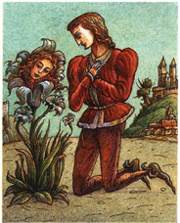
Originated in the novel and symbolizing the victory of the poetic over the material, the flower became an emblem for German Romanticism.
http://www.amazon.com/Henry-von-Ofterdingen-Romance-Editions/dp/0486795772
The short story “Cardinal Napellus” by Gustav Meyrink (1868 – 1932) -- an Austrian author, most famous for his novel “The Golem” -- tells about the other blue flower, quite real. Aconitum napellus, or monkshood, the poisonous plant has flowers dark purple to bluish-purple, helmet-shaped.

In the short story, the flower is a human tall, with steel-blue flowers. One of personages, an old man of the name of Radspieler tells about his life:
“In our neck of the woods, there is one religious sect Blue Fraters whose members bury each other alive when feeling the nearness of death. The building of their friary is still standing, with the blazon carved in stone above the entrance: the poisonous plant with five blue petals and the upper one looking like a monk’s hood -- Aconitum napellus – wolfsbane.I joined the friary when I was a young man, and I left it in the twilight of my life.The friary precincts have a garden – there is a bed of the mentioned poisonous plant, and in summer the monks water the flowers with blood from wounds received during the scourging. Joining the friary, everyone plans the flower, which is to be given a Christian name like of baptism. My flower bore the name of Jerome and it fed on my blood, while I pined for a miracle, for years and in vain, waiting for the Invisible Gardener who could wash the roots of my life with a drop of water.The baptism of blood. The symbolic meaning of this weird ritual suggests that a human is to plant his own soul in the Garden of Eden and to assist in its growing by watering with blood of desires. A legend has it that the first wolfsbane sprang up -- a human tall, flowery all over – on the grave mound of the founder of this ascetic sect, the legendary Cardinal Napellus, on a clear night. When they opened the coffin they saw there was not his dead body inside. They say that the saint turned into the plant, and all wolfsbanes came from it.”
http://www.amazon.com/other-stories-Dedalus-European-Classics-ebook/dp/B008SWZOZS
Gustave Meyrink’s quotes:
“Read the sacred writings of all the peoples on Earth. Through all of them runs, like a red thread, the hidden Science of attaining and maintaining wakefulness.” (Gustave Meyrink)
“Man is firmly convinced that he is awake; in reality he is caught in a net of sleep and dreams which he has unconsciously woven himself.” (Gustave Meyrink)
Now, about the third blue flower. The author, who added it to the previous two, was this writer. The anchusa azurea is the Blue Flower of my paranormal fiction “Extraordinary Story of a Turnskin”.

Set in a trans-Carpathian land the story about the Turnskin may be dated 18th century, but this medley of events, pictures and scenes could happen much earlier. New, stylish and truly ancient, the story suggests one more theory of werewolves’ origin.
http://www.amazon.com/Extraordinary-Story-Turnskin-Lara-Biyuts-ebook/dp/B00EVTP9ZC
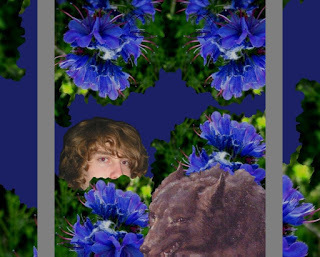
The novel “Heinrich von Ofterdingen” by Novalis (1772 – 1801) -- a poet, author, and philosopher of early German Romanticism – tells a story of a dream of the Blue Flower. Maybe, a sort of a blue lily, but the author gives the flower some mystic features of a beautiful woman.

Originated in the novel and symbolizing the victory of the poetic over the material, the flower became an emblem for German Romanticism.
http://www.amazon.com/Henry-von-Ofterdingen-Romance-Editions/dp/0486795772
The short story “Cardinal Napellus” by Gustav Meyrink (1868 – 1932) -- an Austrian author, most famous for his novel “The Golem” -- tells about the other blue flower, quite real. Aconitum napellus, or monkshood, the poisonous plant has flowers dark purple to bluish-purple, helmet-shaped.

In the short story, the flower is a human tall, with steel-blue flowers. One of personages, an old man of the name of Radspieler tells about his life:
“In our neck of the woods, there is one religious sect Blue Fraters whose members bury each other alive when feeling the nearness of death. The building of their friary is still standing, with the blazon carved in stone above the entrance: the poisonous plant with five blue petals and the upper one looking like a monk’s hood -- Aconitum napellus – wolfsbane.I joined the friary when I was a young man, and I left it in the twilight of my life.The friary precincts have a garden – there is a bed of the mentioned poisonous plant, and in summer the monks water the flowers with blood from wounds received during the scourging. Joining the friary, everyone plans the flower, which is to be given a Christian name like of baptism. My flower bore the name of Jerome and it fed on my blood, while I pined for a miracle, for years and in vain, waiting for the Invisible Gardener who could wash the roots of my life with a drop of water.The baptism of blood. The symbolic meaning of this weird ritual suggests that a human is to plant his own soul in the Garden of Eden and to assist in its growing by watering with blood of desires. A legend has it that the first wolfsbane sprang up -- a human tall, flowery all over – on the grave mound of the founder of this ascetic sect, the legendary Cardinal Napellus, on a clear night. When they opened the coffin they saw there was not his dead body inside. They say that the saint turned into the plant, and all wolfsbanes came from it.”
http://www.amazon.com/other-stories-Dedalus-European-Classics-ebook/dp/B008SWZOZS
Gustave Meyrink’s quotes:
“Read the sacred writings of all the peoples on Earth. Through all of them runs, like a red thread, the hidden Science of attaining and maintaining wakefulness.” (Gustave Meyrink)
“Man is firmly convinced that he is awake; in reality he is caught in a net of sleep and dreams which he has unconsciously woven himself.” (Gustave Meyrink)
Now, about the third blue flower. The author, who added it to the previous two, was this writer. The anchusa azurea is the Blue Flower of my paranormal fiction “Extraordinary Story of a Turnskin”.

Set in a trans-Carpathian land the story about the Turnskin may be dated 18th century, but this medley of events, pictures and scenes could happen much earlier. New, stylish and truly ancient, the story suggests one more theory of werewolves’ origin.
http://www.amazon.com/Extraordinary-Story-Turnskin-Lara-Biyuts-ebook/dp/B00EVTP9ZC

Published on January 20, 2016 06:05
January 15, 2016
Gifts
About gifts.
Please, read the humorous tale by Anton Chekhov (1860-1904)
"A Work Of Art"
Sasha Smirnov, the only son of his mother, holding under his arm, something wrapped up in No. 223 of the Financial News, assumed a sentimental expression, and went into Dr. Koshelkov's consulting-room.
"Ah, dear lad!" was how the doctor greeted him. "Well! how are we feeling? What good news have you for me?"
Sasha blinked, laid his hand on his heart and said in an agitated voice: "Mamma sends her greetings to you, Ivan Nikolaevitch, and told me to thank you. . . . I am the only son of my mother and you have saved my life . . . you have brought me through a dangerous illness and . . . we do not know how to thank you."
"Nonsense, lad!" said the doctor, highly delighted. "I only did what anyone else would have done in my place."
"I am the only son of my mother . . . we are poor people and cannot of course repay you, and we are quite ashamed, doctor, although, however, mamma and I . . . the only son of my mother, earnestly beg you to accept in token of our gratitude . . . this object, which . . . An object of great value, an antique bronze. . . . A rare work of art."
"You shouldn't!" said the doctor, frowning. "What's this for!"
"No, please do not refuse," Sasha went on muttering as he unpacked the parcel. "You will wound mamma and me by refusing. . . . It's a fine thing . . . an antique bronze. . . . It was left us by my deceased father and we have kept it as a precious souvenir. My father used to buy antique bronzes and sell them to connoisseurs . . . Mamma and I keep on the business now."
Sasha undid the object and put it solemnly on the table. It was a not very tall candelabra of old bronze and artistic workmanship. It consisted of a group: on the pedestal stood two female figures in the costume of Eve and in attitudes for the description of which I have neither the courage nor the fitting temperament. The figures were smiling coquettishly and altogether looked as though, had it not been for the necessity of supporting the candlestick, they would have skipped off the pedestal and have indulged in an orgy such as is improper for the reader even to imagine.
Looking at the present, the doctor slowly scratched behind his ear, cleared his throat and blew his nose irresolutely.
"Yes, it certainly is a fine thing," he muttered, "but . . . how shall I express it? . . . it's . . . h'm . . . it's not quite for family reading. It's not simply decolleté but beyond anything, dash it all. . . ."
"How do you mean?"
"The serpent-tempter himself could not have invented anything worse. . . . Why, to put such a phantasmagoria on the table would be defiling the whole flat."
"What a strange way of looking at art, doctor!" said Sasha, offended. "Why, it is an artistic thing, look at it! There is so much beauty and elegance that it fills one's soul with a feeling of reverence and brings a lump into one's throat! When one sees anything so beautiful one forgets everything earthly. . . . Only look, how much movement, what an atmosphere, what expression!"
"I understand all that very well, my dear boy," the doctor interposed, "but you know I am a family man, my children run in here, ladies come in."
"Of course if you look at it from the point of view of the crowd," said Sasha, "then this exquisitely artistic work may appear in a certain light. . . . But, doctor, rise superior to the crowd, especially as you will wound mamma and me by refusing it. I am the only son of my mother, you have saved my life. . . . We are giving you the thing most precious to us and . . . and I only regret that I have not the pair to present to you. . . ."
"Thank you, my dear fellow, I am very grateful . . . Give my respects to your mother but really consider, my children run in here, ladies come. . . . However, let it remain! I see there's no arguing with you."
"And there is nothing to argue about," said Sasha, relieved. "Put the candlestick here, by this vase. What a pity we have not the pair to it! It is a pity! Well, good-bye, doctor."
After Sasha's departure the doctor looked for a long time at the candelabra, scratched behind his ear and meditated.
"It's a superb thing, there's no denying it," he thought, "and it would be a pity to throw it away. . . . But it's impossible for me to keep it. . . . H'm! . . . Here's a problem! To whom can I make a present of it, or to what charity can I give it?"
After long meditation he thought of his good friend, the lawyer Uhov, to whom he was indebted for the management of legal business.
"Excellent," the doctor decided, "it would be awkward for him as a friend to take money from me, and it will be very suitable for me to present him with this. I will take him the devilish thing! Luckily he is a bachelor and easy-going."
Without further procrastination the doctor put on his hat and coat, took the candelabra and went off to Uhov's.
"How are you, friend!" he said, finding the lawyer at home. "I've come to see you . . . to thank you for your efforts. . . . You won't take money so you must at least accept this thing here. . . . See, my dear fellow. . . . The thing is magnificent!"
On seeing the bronze the lawyer was moved to indescribable delight.
"What a specimen!" he chuckled. "Ah, deuce take it, to think of them imagining such a thing, the devils! Exquisite! Ravishing! Where did you get hold of such a delightful thing?"
After pouring out his ecstasies the lawyer looked timidly towards the door and said: "Only you must carry off your present, my boy. . . . I can't take it. . . ."
"Why?" cried the doctor, disconcerted.
"Why . . . because my mother is here at times, my clients . . . besides I should be ashamed for my servants to see it."
"Nonsense! Nonsense! Don't you dare to refuse!" said the doctor, gesticulating. "It's piggish of you! It's a work of art! . . . What movement. . . what expression! I won't even talk of it! You will offend me!"
"If one could plaster it over or stick on fig-leaves . . . "
But the doctor gesticulated more violently than before, and dashing out of the flat went home, glad that he had succeeded in getting the present off his hands.
When he had gone away the lawyer examined the candelabra, fingered it all over, and then, like the doctor, racked his brains over the question what to do with the present.
"It's a fine thing," he mused, "and it would be a pity to throw it away and improper to keep it. The very best thing would be to make a present of it to someone. . . . I know what! I'll take it this evening to Shashkin, the comedian. The rascal is fond of such things, and by the way it is his benefit tonight."
No sooner said than done. In the evening the candelabra, carefully wrapped up, was duly carried to Shashkin's. The whole evening the comic actor's dressing-room was besieged by men coming to admire the present; the dressing-room was filled with the hum of enthusiasm and laughter like the neighing of horses. If one of the actresses approached the door and asked: "May I come in?" the comedian's husky voice was heard at once: "No, no, my dear, I am not dressed!"
After the performance the comedian shrugged his shoulders, flung up his hands and said: "Well what am I to do with the horrid thing? Why, I live in a private flat! Actresses come and see me! It's not a photograph that you can put in a drawer!"
"You had better sell it, sir," the hairdresser who was disrobing the actor advised him. "There's an old woman living about here who buys antique bronzes. Go and enquire for Madame Smirnov . . . everyone knows her."
The actor followed his advice. . . . Two days later the doctor was sitting in his consulting-room, and with his finger to his brow was meditating on the acids of the bile. All at once the door opened and Sasha Smirnov flew into the room. He was smiling, beaming, and his whole figure was radiant with happiness. In his hands he held something wrapped up in newspaper.
"Doctor!" he began breathlessly, "imagine my delight! Happily for you we have succeeded in picking up the pair to your candelabra! Mamma is so happy. . . . I am the only son of my mother, you saved my life. . . ."
And Sasha, all of a tremor with gratitude, set the candelabra before the doctor. The doctor opened his mouth, tried to say something, but said nothing: he could not speak.
http://www.online-literature.com/anton_chekhov/1194/
Next, please, confer, seeing the picture --
below, one of cartoons by Herluf Bidstrup (1912-1988) "Return of the Gift"
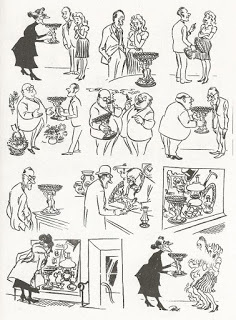
Personally I love both the tale and cartoon. NB: Herluf Bidstrup was a Commie of Denmark, but I always appreciated his art. For my part, I want all Commies and leftists to go to hell, but I did what I wanted by publishing this blog post, for the sake of history, and because it's funny and the cartoon is chucklesome. Thank you for reading.
Please, read the humorous tale by Anton Chekhov (1860-1904)
"A Work Of Art"
Sasha Smirnov, the only son of his mother, holding under his arm, something wrapped up in No. 223 of the Financial News, assumed a sentimental expression, and went into Dr. Koshelkov's consulting-room.
"Ah, dear lad!" was how the doctor greeted him. "Well! how are we feeling? What good news have you for me?"
Sasha blinked, laid his hand on his heart and said in an agitated voice: "Mamma sends her greetings to you, Ivan Nikolaevitch, and told me to thank you. . . . I am the only son of my mother and you have saved my life . . . you have brought me through a dangerous illness and . . . we do not know how to thank you."
"Nonsense, lad!" said the doctor, highly delighted. "I only did what anyone else would have done in my place."
"I am the only son of my mother . . . we are poor people and cannot of course repay you, and we are quite ashamed, doctor, although, however, mamma and I . . . the only son of my mother, earnestly beg you to accept in token of our gratitude . . . this object, which . . . An object of great value, an antique bronze. . . . A rare work of art."
"You shouldn't!" said the doctor, frowning. "What's this for!"
"No, please do not refuse," Sasha went on muttering as he unpacked the parcel. "You will wound mamma and me by refusing. . . . It's a fine thing . . . an antique bronze. . . . It was left us by my deceased father and we have kept it as a precious souvenir. My father used to buy antique bronzes and sell them to connoisseurs . . . Mamma and I keep on the business now."
Sasha undid the object and put it solemnly on the table. It was a not very tall candelabra of old bronze and artistic workmanship. It consisted of a group: on the pedestal stood two female figures in the costume of Eve and in attitudes for the description of which I have neither the courage nor the fitting temperament. The figures were smiling coquettishly and altogether looked as though, had it not been for the necessity of supporting the candlestick, they would have skipped off the pedestal and have indulged in an orgy such as is improper for the reader even to imagine.
Looking at the present, the doctor slowly scratched behind his ear, cleared his throat and blew his nose irresolutely.
"Yes, it certainly is a fine thing," he muttered, "but . . . how shall I express it? . . . it's . . . h'm . . . it's not quite for family reading. It's not simply decolleté but beyond anything, dash it all. . . ."
"How do you mean?"
"The serpent-tempter himself could not have invented anything worse. . . . Why, to put such a phantasmagoria on the table would be defiling the whole flat."
"What a strange way of looking at art, doctor!" said Sasha, offended. "Why, it is an artistic thing, look at it! There is so much beauty and elegance that it fills one's soul with a feeling of reverence and brings a lump into one's throat! When one sees anything so beautiful one forgets everything earthly. . . . Only look, how much movement, what an atmosphere, what expression!"
"I understand all that very well, my dear boy," the doctor interposed, "but you know I am a family man, my children run in here, ladies come in."
"Of course if you look at it from the point of view of the crowd," said Sasha, "then this exquisitely artistic work may appear in a certain light. . . . But, doctor, rise superior to the crowd, especially as you will wound mamma and me by refusing it. I am the only son of my mother, you have saved my life. . . . We are giving you the thing most precious to us and . . . and I only regret that I have not the pair to present to you. . . ."
"Thank you, my dear fellow, I am very grateful . . . Give my respects to your mother but really consider, my children run in here, ladies come. . . . However, let it remain! I see there's no arguing with you."
"And there is nothing to argue about," said Sasha, relieved. "Put the candlestick here, by this vase. What a pity we have not the pair to it! It is a pity! Well, good-bye, doctor."
After Sasha's departure the doctor looked for a long time at the candelabra, scratched behind his ear and meditated.
"It's a superb thing, there's no denying it," he thought, "and it would be a pity to throw it away. . . . But it's impossible for me to keep it. . . . H'm! . . . Here's a problem! To whom can I make a present of it, or to what charity can I give it?"
After long meditation he thought of his good friend, the lawyer Uhov, to whom he was indebted for the management of legal business.
"Excellent," the doctor decided, "it would be awkward for him as a friend to take money from me, and it will be very suitable for me to present him with this. I will take him the devilish thing! Luckily he is a bachelor and easy-going."
Without further procrastination the doctor put on his hat and coat, took the candelabra and went off to Uhov's.
"How are you, friend!" he said, finding the lawyer at home. "I've come to see you . . . to thank you for your efforts. . . . You won't take money so you must at least accept this thing here. . . . See, my dear fellow. . . . The thing is magnificent!"
On seeing the bronze the lawyer was moved to indescribable delight.
"What a specimen!" he chuckled. "Ah, deuce take it, to think of them imagining such a thing, the devils! Exquisite! Ravishing! Where did you get hold of such a delightful thing?"
After pouring out his ecstasies the lawyer looked timidly towards the door and said: "Only you must carry off your present, my boy. . . . I can't take it. . . ."
"Why?" cried the doctor, disconcerted.
"Why . . . because my mother is here at times, my clients . . . besides I should be ashamed for my servants to see it."
"Nonsense! Nonsense! Don't you dare to refuse!" said the doctor, gesticulating. "It's piggish of you! It's a work of art! . . . What movement. . . what expression! I won't even talk of it! You will offend me!"
"If one could plaster it over or stick on fig-leaves . . . "
But the doctor gesticulated more violently than before, and dashing out of the flat went home, glad that he had succeeded in getting the present off his hands.
When he had gone away the lawyer examined the candelabra, fingered it all over, and then, like the doctor, racked his brains over the question what to do with the present.
"It's a fine thing," he mused, "and it would be a pity to throw it away and improper to keep it. The very best thing would be to make a present of it to someone. . . . I know what! I'll take it this evening to Shashkin, the comedian. The rascal is fond of such things, and by the way it is his benefit tonight."
No sooner said than done. In the evening the candelabra, carefully wrapped up, was duly carried to Shashkin's. The whole evening the comic actor's dressing-room was besieged by men coming to admire the present; the dressing-room was filled with the hum of enthusiasm and laughter like the neighing of horses. If one of the actresses approached the door and asked: "May I come in?" the comedian's husky voice was heard at once: "No, no, my dear, I am not dressed!"
After the performance the comedian shrugged his shoulders, flung up his hands and said: "Well what am I to do with the horrid thing? Why, I live in a private flat! Actresses come and see me! It's not a photograph that you can put in a drawer!"
"You had better sell it, sir," the hairdresser who was disrobing the actor advised him. "There's an old woman living about here who buys antique bronzes. Go and enquire for Madame Smirnov . . . everyone knows her."
The actor followed his advice. . . . Two days later the doctor was sitting in his consulting-room, and with his finger to his brow was meditating on the acids of the bile. All at once the door opened and Sasha Smirnov flew into the room. He was smiling, beaming, and his whole figure was radiant with happiness. In his hands he held something wrapped up in newspaper.
"Doctor!" he began breathlessly, "imagine my delight! Happily for you we have succeeded in picking up the pair to your candelabra! Mamma is so happy. . . . I am the only son of my mother, you saved my life. . . ."
And Sasha, all of a tremor with gratitude, set the candelabra before the doctor. The doctor opened his mouth, tried to say something, but said nothing: he could not speak.
http://www.online-literature.com/anton_chekhov/1194/
Next, please, confer, seeing the picture --
below, one of cartoons by Herluf Bidstrup (1912-1988) "Return of the Gift"

Personally I love both the tale and cartoon. NB: Herluf Bidstrup was a Commie of Denmark, but I always appreciated his art. For my part, I want all Commies and leftists to go to hell, but I did what I wanted by publishing this blog post, for the sake of history, and because it's funny and the cartoon is chucklesome. Thank you for reading.
Published on January 15, 2016 07:34
December 11, 2015
winter holidays

Wishing you the Christmas of your dreams... and may your New Year be a joyful one.

About the picture, above. Artist: V. A. Tropinin (1776 - 1857). Woman at the Window, or A Treasurer's Wife as an illustration to the poem by Mikhail Lermontov -- Женщина в окне, или Казначейша по поэме Лермонтова Тамбовская Казначейша. Имя персонажа поэмы Авдотья Николавна Бобковская. Prototype of the personage is Countess Maria Razumovsky (1772 — 1865) lady in waiting, whose lover 'won' her from her husband in the game of cards. https://ru.wikipedia.org/wiki/%D0%A0%D0%B0%D0%B7%D1%D0%BC%D0%BE%D0%B2%D1%D0%BA%D0%B0%D1%8F,_%D0%9C%D0%B0%D1%D0%B8%D1%8F_%D0%D1%D0%B8%D0%B3%D0%BE%D1%D1%8C%D0%B5%D0%B2%D0%BD%D0%B0


My tale "Eric's Wonderful Quest" is available at https://www.smashwords.com/books/view/595873

The fans of my historical paranormal "A Handful of Blossoms" get positively crazy.) Fancy that! They think of the book at #datingclubs ! (See the picture above) The novella is available at https://www.smashwords.com/books/view/168036

Published on December 11, 2015 09:50
November 19, 2015
fantasy
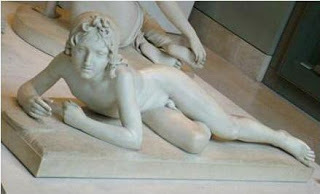
The roseleaves flutter, pouring his hands, face, clothes, the roseleaves cover all around him. Rosy, white, crimson, they flutter, flutter, flutter. He feels like catching them, feeling their queer tenderness on his skin, fluttering and whirling along with them, throwing them up -- as though it all will be always. As though it all was always. As though the whole world was made for him, and he for the world. And the world goes round whirlling along with him. ‘Porphyro! Do you like the flowers?’ Running out of the spectral rain of the fragrant roseleaves, he felt like taking a hand of a stranger in his to feel a glow and realize impossibility to understand. ‘They are beautiful, aren’t they?’‘Yes, Lysander, the flowers of your mother are beautiful.’ ‘But they are not hers! They are the world’s. They are yours. And mine.’ A touch to the face -- he runs with fingers over the cheek, plays the hair, takes the hand in his. ‘Come along, Porphyro, I’ll show you they are ours.’At rare moments like this, Porphyro’s brown eyes become a teeny bit warmer, a teeny bit closer, and Lysander believes that another moment Porphyro comes to believe that the flowers are theirs. And the sky is theirs. And the world is theirs. And they are the world’s, and not the Empress Flavia’s, despite she is the Empire itself. ‘Porphyro, do you think I can endear anybody?’‘I think yes, Lysander.’ ‘If I’ll be able to escape from the Empress? If I’ll be able to save myself to remain for ever one?’ ‘You will, if you wish.’ ‘Will I be happy with the one who I endear? With the one who will endear me?’ ‘Yes, Lysander, it will be so.’ Another touch to the cheek. ‘Thank you, Porphyro. Thank you for your belief… A heap of leaves flatly flies about between those who feel certain that they know a truth about me. Through the foliage…’Lysander disregarded the words, which Favorinus addressed to him lately. The man’s chief claim to fame was his awesome oracles. The men like Favorinus did not live long. Lysander disregarded his cousins’ laughter, and he noticed neither the surprised-contemptuous eyes of the courtiers nor the puzzled talks of the tutors. He merely saw the light. On the night. In his own eyes. In the eyes of others, if the light was there. But the light was not there largely. There was only emptiness, odd, compelling, which was not within him. Was that not enough? Everyone around him talked of something. Cornelius Fronto with his ornate style (Lysander had nearly forgotten those names: Ulpii, Aelii) and everyone was perturbed about the same delicate circumstance; everyone would like to find that little boy sooner than the Emperor would do it. But nothing had changed to Lysander, unless his birthday crept up to, every month, every day, every minute. Lysander was looking at himself in a mirror and he understood more and more clearly: soon he would be no more. And nobody would have time to endear him. And he would not have time to endear anybody. Everything at the damned ceremony would be smashed to smithereens -- and he would be no more. But the story of the Aelii gave him a chance to escape, survive, remain for ever one -- to be alive. Lysander should seize the chance. As soon as the hunt for the young Aurelius had begun, Lysander and Porphyro escaped from the Palace. But only Lysander knew that they escaped. For the Empress, they just departed to Baiae. The chance should be seized -- and this instant he might remember of it no longer, putting it out of his head, going on living to see the light… Today he again, as it used to be long ago, feels free. He has done something, and the damnation has quieted down. Again he does not know what he has ahead of him, he does not know his tomorrow. That’s great. True, the uncertainty is an extraordinary feeling. It’s like some cold somewhere deep in one’s heart, the cold of a beginning panic. But he felt able to manage with it. He knows: a wind is with him again, which is so good. Let the stone jungles of the Great City be around him, but his old friend is with him again. The dark-haired, statuesque boy, he has come, he has responded to Lysander’s call. Both of them know the sense of freedom, the sense of absolute danger, when they must draw up, ready to do anything, when red flags and loud cries of hunters could be beyond the next hill. Let it be. He’s ready today. As for in the future – all’s on the scales of the Fates. May his scale outweigh.
the end of the excerptRead more in the novelForever Jocelyn http://www.smashwords.com/books/view/30041
Published on November 19, 2015 10:03
October 4, 2015
gothic fun
The Black Obelisk for Evil Empire
Gothic fun. Have you ever heard of such a thing? Moreover, someone’s confrontation to KGB as a gothic fun. Read the report. 19 September, 2015. A city in Russia. By night. Something surrealistic. A lot of tough men wearing dark jackets with corpses in arms, tilted forwards, are fussing about the city on the night. It’s local undertakers’ offices began fighting with ROC (Russian Orthodox Church) which is a branch of KGB, in Russia, nowadays.The story began in 2010, when the square of ground, next to the building of the regional Bureau of Forensic Medical Examination, was allotted to the Eparchy of ROC for free using and construction of a “small shrine”. True, the clerics built the shrine, but they built an edifice in addition -– the hall for parting “Ascension” -- which looked like an undertaker’s office. This object of capital construction, ROC registered the square of ground as their property and enthusiastically started fighting with rivals.The Bureau of Forensic Medical Examination was sandwiched between buildings of the local Hospital and Scientific Research Institute. Initially the Hospital forbade undertakers to use the territory of the Hospital for carrying dead bodies. After the Hall “Ascension” was built, the Bureau became partitioned off from the civilized world, because ROC’s Hall “Ascension” blocked access to the Bureau’s mortuary. So, the Bureau is sandwiched between the Hospital and the new building of the privileged undertaker’s office that refused to let the Bureau the servitude. The Hospital states that this kind of activity with dead bodies is a bad influence on inhabitants, and the funeral mafia of the “Ascension” asks 5000 roubles for each transportation – in other words, for each carrying a dead body through its own territory. The Bureau of Forensic Medical Examination is a conveyor working day and night, the work cannot be stopped, which plays into the hands of the bandits wearing funeral garments, who seek to earn by this.Now, on the night of 19 September, 2015, the Mortuary is besieged. The riotous undertakers are about to take the “Ascension” by assault. Fussing about with corpses in arms, they look uncanny, but everything looks uncanny on the night, and they are going to camp out.Funeral vehicle drivers came unstuck. They are to bring dead bodies to medical examiners of the Bureau and take dead bodies away to funerals. On the night, they have an especially large “lot of goods”: about 40 dead bodies are to be taken from the Mortuary of the Bureau of Forensic Medical Examination and about 20 dead bodies are to be brought to. But fences and security guard there are on all sides. Undertakers on foot with stretchers in hands are forbidden to enter too. By 20:00, at the entrance to the territory of the Hall “Ascension”, 3 hearses come and block the gates. All 3 contain dead bodies. 10 hearses more are parked in nearby yards and on sides of the street. About 50 tough men who earn on transport operations with corpses gather in a mob in front of the security cabin. From the Hall “Ascension”, 5 men of the security guard come up to the fence and the cabin. A woman wants to get her relative’s dead body, which she is to get from the Bureau of Forensic Medical Examination, but she is stopped by a man who introduces himself as the chief of the “Ascension” security.Indignant, undertakers are noisy, bridling at and trying the strength of the fence; the security men sullenly snarl at them; the dead humans are silent and stinking. The point is that some undertakers’ offices are unable to deliver dead bodies to the mortuary of the Bureau of Forensic Medical Examination over the last several days because of the conflict. No refrigerators; the corpses are decomposing in the cars. The air is stinky.Besides the undertakers, there are relatives of the deceased in the mob at the entrance to the territory of the “Ascension”. One woman came to get her late mother’s dead body for taking it to a funeral.While everyone mobs and quarrels at the “Ascension”, the gumptious woman and her friends get over the fence to the territory of Eye Microsurgery; next, she climbs over into the territory of the Bureau of Forensic Medical Examination, where she gets the dead body of her late mother. She and her friends with the dead body in hands come out through the besieged entrance. The security guard of the “Ascension” never stops her; now, the dead body is placed in a car and taken away.Seeing the security men are impossible to be talked into, the mob of undertakers divides into groups. Some of them are on duty at the entrance, not allowing the security men to relax. Some go to buy hot coffee. Coffee for everyone. The undertakers make fun by saying that it’s time to camp out and create their own maidan. There are representatives of different undertakers’ offices in the mob, rivals, but in the face of the common enemy, these semi-criminal looking men, yesterday rivals, are quick to league together. While the mob has coffee, a wizard works on the numerous video cameras on posts along the perimeter inside the territory of the “Ascension”. The reliable God for reliable clients.From time to time, representatives of undertakers’ offices move aside to hold a conference – developing a common strategy. No sense of being lost or losing heart, in the mob. All those present are sure that they will deliver their dead load, tonight, and get what they are to get. No one has any doubts about that. Discussed variants are various: from bribery to assault. This last is discussed openly and in earnest – so much that the policemen, who hear this, feel ill at ease. The policemen are 5, 2 men of traffic police, 5 security men of the “Ascension”, who are uncertain about their wish to fight. Аnd they have 50 tough hot undertakers, who look like sad troublemakers who used to be in conflict with the law more than once.But the mob of undertakers is thinning out, for the talks round into a plan. Most of the cars go away and begin circling the area of the city. In search of a trapdoor. The rest undertakers remain waiting, having coffee and distracting police and security guard of the “Ascension”.By 23:00, at the entrance to the territory of the “Ascension” there are only 3 hearses, those blocking the entrance. Undertakers sayin undertones: a trapdoor is found! To be more exact, the trapdoor is hand-made on the side of a street between the Hospital and Eye Microsurgery.The trapdoor opens into the Hospital’s territory, where there is a parking lot with barrier. As some undertakers said afterwards, in the still of the night, one of the hearses managed to slip under the barrier, going after a car. According to others, the drivers simply raised the barrier and drove into the territory of the Hospital, where they found the gates – which got broken for some reason – and went to the desired Mortuary of medical examiners.After these actions, the security guard of the Hospital decides that the lesser evil is to give corridor for the undertakers. True, the security guard has called several cars of a private security company, but it looks like it’s for their own security. The men of the private security company don’t hasten to fight with the groups of hot undertakers; they merely remain to look after the hotness. Meanwhile, at a distance of a couple of meters, the unloading and loading of the hearses is in full swing.The handling looks like this. A hearse stops nearby the barrier and is quickly unloaded, with dead bodies being placed on the ground. The crew of the hearse quickly place the bodies on stretchers or tarpaulin, often two dead bodies at the same time. Next, the undertakers take their cargo and run. The distance from the barrier to the Mortuary is a kilometer – in the dark, on the uneven, bumpy road, with a corpse in hands.Some of undertakers manage to enter the territory by their own cars. Hearses cannot be let in, but the Land Rover is allowed to do it. 4 dead bodies are placed in the car and taken away from the Mortuary. But the most of dead bodies do this journey by stretchers in hands of walking undertakers. The dead body bearers pant, on the move, mutter curses, stumble in the dark, but they don’t let a corpse out.The dead bodies are sorted out on the move — on the ground. A moment more and the dead bodies are taken away: some to the Mortuary, some to cars. A heap of black bags on the ground at the desired chambers below ground. Some of the bags are carried to the Mortuary; some from the Mortuary. Some of the black bags are ready for packing dead bodies which will be mourned at funerals, tonight, in case if undertakers manage to deliver the bodies. Deliver it, get it, take it, and run. Mutual aid between undertakers: the yesterday rivals friendly help each other to carry dead bodies tonight. They say that the main point is not to confuse corpses and hearses. Fighting with the mafia of ROC. Next day, the trapdoor is blocked by soldiers in the territory of the Hospital. Soldiers guard all doors and holes that can let undertakers in. Soldiers lock up the gates, which were available a day ago. A lot of policemen came to the area to keep order. By night, the surroundings of the regional Bureau of Forensic Medical Examination is filled with hearses again. The ranks of undertakers have decreased in number since last night. From 50 to 20. Reconnoitring the terrain and comparing the strength, men of undertakers’ offices renounce the use of force — too many policemen. Then, undertakers decide to do it otherwise.To representatives of the “Ascension”, they say, “You don’t allow us to carry dead bodies through your territory? Do it yourselves.” With that, at 21:00, they place the first dead body at the gates. This turn confuse the security men as well as the policemen on duty who watch from afar. They use theirmobiles toask theirbosses. Using the hesitation in the ranks of policemen and the “Ascension” security guard, undertakers take the second corpse out of the hearse and place it nearby the first. Next, the undertakers thrust both corpses underneath the gates to the territory of the “Ascension”. Proper documents are in each of the black bags with corpses. The “Ascension” security men are offered to carry the dead bodies to the Bureau of Forensic Medical Examination. But the men refuse. The bags with corpses prevent cars from entering the territory of the “Ascension”. Policemen don’t let thrust the third corps in the gates. The policemen want to take bosses of the transport operations to the police office. As their collaborators told afterwards, one of the detained was imputed rebellion against police. Now, unloading dead bodies at the gates of the “Ascension” is stopped. To the gates of the “Ascension”, a van is sent. The policemen put 13 detained men of undertakers’ offices in the van. Only 2 of the men are let go, because the two show their identity cards. All the rest are taken into custody till their identity is determined.By 23:00, a group of policemen arrive upon the scene – they came to register 2 dead bodies at the gates. After examination and photographing, the corpses are placed in a hearse of the “Ascension”. The dead humans’ lot remained obscure, but they reached the mortuary, most probably. Thus, the next night confrontation comes to an end. Depressed, the undertakers depart, muttering curses. Policemen leave the scene too. AfterwordSome say that ROC is not guilty, and that merchants are those who have built up all the area. But the cadastral map, on open access, reads the purpose the square of ground was marked out for. The Eparchy asked the land for construction of a shrine with a hall for parting. “In fact, they have a real undertaker’s office. I never saw parishioners coming to the Hall Ascension,” the head of the city administration said.
¯\_(ツ)_/¯
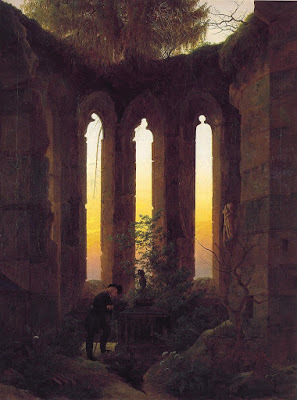
Gothic fun. Have you ever heard of such a thing? Moreover, someone’s confrontation to KGB as a gothic fun. Read the report. 19 September, 2015. A city in Russia. By night. Something surrealistic. A lot of tough men wearing dark jackets with corpses in arms, tilted forwards, are fussing about the city on the night. It’s local undertakers’ offices began fighting with ROC (Russian Orthodox Church) which is a branch of KGB, in Russia, nowadays.The story began in 2010, when the square of ground, next to the building of the regional Bureau of Forensic Medical Examination, was allotted to the Eparchy of ROC for free using and construction of a “small shrine”. True, the clerics built the shrine, but they built an edifice in addition -– the hall for parting “Ascension” -- which looked like an undertaker’s office. This object of capital construction, ROC registered the square of ground as their property and enthusiastically started fighting with rivals.The Bureau of Forensic Medical Examination was sandwiched between buildings of the local Hospital and Scientific Research Institute. Initially the Hospital forbade undertakers to use the territory of the Hospital for carrying dead bodies. After the Hall “Ascension” was built, the Bureau became partitioned off from the civilized world, because ROC’s Hall “Ascension” blocked access to the Bureau’s mortuary. So, the Bureau is sandwiched between the Hospital and the new building of the privileged undertaker’s office that refused to let the Bureau the servitude. The Hospital states that this kind of activity with dead bodies is a bad influence on inhabitants, and the funeral mafia of the “Ascension” asks 5000 roubles for each transportation – in other words, for each carrying a dead body through its own territory. The Bureau of Forensic Medical Examination is a conveyor working day and night, the work cannot be stopped, which plays into the hands of the bandits wearing funeral garments, who seek to earn by this.Now, on the night of 19 September, 2015, the Mortuary is besieged. The riotous undertakers are about to take the “Ascension” by assault. Fussing about with corpses in arms, they look uncanny, but everything looks uncanny on the night, and they are going to camp out.Funeral vehicle drivers came unstuck. They are to bring dead bodies to medical examiners of the Bureau and take dead bodies away to funerals. On the night, they have an especially large “lot of goods”: about 40 dead bodies are to be taken from the Mortuary of the Bureau of Forensic Medical Examination and about 20 dead bodies are to be brought to. But fences and security guard there are on all sides. Undertakers on foot with stretchers in hands are forbidden to enter too. By 20:00, at the entrance to the territory of the Hall “Ascension”, 3 hearses come and block the gates. All 3 contain dead bodies. 10 hearses more are parked in nearby yards and on sides of the street. About 50 tough men who earn on transport operations with corpses gather in a mob in front of the security cabin. From the Hall “Ascension”, 5 men of the security guard come up to the fence and the cabin. A woman wants to get her relative’s dead body, which she is to get from the Bureau of Forensic Medical Examination, but she is stopped by a man who introduces himself as the chief of the “Ascension” security.Indignant, undertakers are noisy, bridling at and trying the strength of the fence; the security men sullenly snarl at them; the dead humans are silent and stinking. The point is that some undertakers’ offices are unable to deliver dead bodies to the mortuary of the Bureau of Forensic Medical Examination over the last several days because of the conflict. No refrigerators; the corpses are decomposing in the cars. The air is stinky.Besides the undertakers, there are relatives of the deceased in the mob at the entrance to the territory of the “Ascension”. One woman came to get her late mother’s dead body for taking it to a funeral.While everyone mobs and quarrels at the “Ascension”, the gumptious woman and her friends get over the fence to the territory of Eye Microsurgery; next, she climbs over into the territory of the Bureau of Forensic Medical Examination, where she gets the dead body of her late mother. She and her friends with the dead body in hands come out through the besieged entrance. The security guard of the “Ascension” never stops her; now, the dead body is placed in a car and taken away.Seeing the security men are impossible to be talked into, the mob of undertakers divides into groups. Some of them are on duty at the entrance, not allowing the security men to relax. Some go to buy hot coffee. Coffee for everyone. The undertakers make fun by saying that it’s time to camp out and create their own maidan. There are representatives of different undertakers’ offices in the mob, rivals, but in the face of the common enemy, these semi-criminal looking men, yesterday rivals, are quick to league together. While the mob has coffee, a wizard works on the numerous video cameras on posts along the perimeter inside the territory of the “Ascension”. The reliable God for reliable clients.From time to time, representatives of undertakers’ offices move aside to hold a conference – developing a common strategy. No sense of being lost or losing heart, in the mob. All those present are sure that they will deliver their dead load, tonight, and get what they are to get. No one has any doubts about that. Discussed variants are various: from bribery to assault. This last is discussed openly and in earnest – so much that the policemen, who hear this, feel ill at ease. The policemen are 5, 2 men of traffic police, 5 security men of the “Ascension”, who are uncertain about their wish to fight. Аnd they have 50 tough hot undertakers, who look like sad troublemakers who used to be in conflict with the law more than once.But the mob of undertakers is thinning out, for the talks round into a plan. Most of the cars go away and begin circling the area of the city. In search of a trapdoor. The rest undertakers remain waiting, having coffee and distracting police and security guard of the “Ascension”.By 23:00, at the entrance to the territory of the “Ascension” there are only 3 hearses, those blocking the entrance. Undertakers sayin undertones: a trapdoor is found! To be more exact, the trapdoor is hand-made on the side of a street between the Hospital and Eye Microsurgery.The trapdoor opens into the Hospital’s territory, where there is a parking lot with barrier. As some undertakers said afterwards, in the still of the night, one of the hearses managed to slip under the barrier, going after a car. According to others, the drivers simply raised the barrier and drove into the territory of the Hospital, where they found the gates – which got broken for some reason – and went to the desired Mortuary of medical examiners.After these actions, the security guard of the Hospital decides that the lesser evil is to give corridor for the undertakers. True, the security guard has called several cars of a private security company, but it looks like it’s for their own security. The men of the private security company don’t hasten to fight with the groups of hot undertakers; they merely remain to look after the hotness. Meanwhile, at a distance of a couple of meters, the unloading and loading of the hearses is in full swing.The handling looks like this. A hearse stops nearby the barrier and is quickly unloaded, with dead bodies being placed on the ground. The crew of the hearse quickly place the bodies on stretchers or tarpaulin, often two dead bodies at the same time. Next, the undertakers take their cargo and run. The distance from the barrier to the Mortuary is a kilometer – in the dark, on the uneven, bumpy road, with a corpse in hands.Some of undertakers manage to enter the territory by their own cars. Hearses cannot be let in, but the Land Rover is allowed to do it. 4 dead bodies are placed in the car and taken away from the Mortuary. But the most of dead bodies do this journey by stretchers in hands of walking undertakers. The dead body bearers pant, on the move, mutter curses, stumble in the dark, but they don’t let a corpse out.The dead bodies are sorted out on the move — on the ground. A moment more and the dead bodies are taken away: some to the Mortuary, some to cars. A heap of black bags on the ground at the desired chambers below ground. Some of the bags are carried to the Mortuary; some from the Mortuary. Some of the black bags are ready for packing dead bodies which will be mourned at funerals, tonight, in case if undertakers manage to deliver the bodies. Deliver it, get it, take it, and run. Mutual aid between undertakers: the yesterday rivals friendly help each other to carry dead bodies tonight. They say that the main point is not to confuse corpses and hearses. Fighting with the mafia of ROC. Next day, the trapdoor is blocked by soldiers in the territory of the Hospital. Soldiers guard all doors and holes that can let undertakers in. Soldiers lock up the gates, which were available a day ago. A lot of policemen came to the area to keep order. By night, the surroundings of the regional Bureau of Forensic Medical Examination is filled with hearses again. The ranks of undertakers have decreased in number since last night. From 50 to 20. Reconnoitring the terrain and comparing the strength, men of undertakers’ offices renounce the use of force — too many policemen. Then, undertakers decide to do it otherwise.To representatives of the “Ascension”, they say, “You don’t allow us to carry dead bodies through your territory? Do it yourselves.” With that, at 21:00, they place the first dead body at the gates. This turn confuse the security men as well as the policemen on duty who watch from afar. They use theirmobiles toask theirbosses. Using the hesitation in the ranks of policemen and the “Ascension” security guard, undertakers take the second corpse out of the hearse and place it nearby the first. Next, the undertakers thrust both corpses underneath the gates to the territory of the “Ascension”. Proper documents are in each of the black bags with corpses. The “Ascension” security men are offered to carry the dead bodies to the Bureau of Forensic Medical Examination. But the men refuse. The bags with corpses prevent cars from entering the territory of the “Ascension”. Policemen don’t let thrust the third corps in the gates. The policemen want to take bosses of the transport operations to the police office. As their collaborators told afterwards, one of the detained was imputed rebellion against police. Now, unloading dead bodies at the gates of the “Ascension” is stopped. To the gates of the “Ascension”, a van is sent. The policemen put 13 detained men of undertakers’ offices in the van. Only 2 of the men are let go, because the two show their identity cards. All the rest are taken into custody till their identity is determined.By 23:00, a group of policemen arrive upon the scene – they came to register 2 dead bodies at the gates. After examination and photographing, the corpses are placed in a hearse of the “Ascension”. The dead humans’ lot remained obscure, but they reached the mortuary, most probably. Thus, the next night confrontation comes to an end. Depressed, the undertakers depart, muttering curses. Policemen leave the scene too. AfterwordSome say that ROC is not guilty, and that merchants are those who have built up all the area. But the cadastral map, on open access, reads the purpose the square of ground was marked out for. The Eparchy asked the land for construction of a shrine with a hall for parting. “In fact, they have a real undertaker’s office. I never saw parishioners coming to the Hall Ascension,” the head of the city administration said.
¯\_(ツ)_/¯

Published on October 04, 2015 11:01
September 11, 2015
jio

Some experts say that if we want to see the face of Mona Lisa by Leonardo da Vinci (1503–1505/1507) turning, we should look at the head of St Anne in the picture The Virgin and Child with St Anne by Leonardo (c. 1510). The same face, they say.
https://www.smashwords.com/books/view/441878
https://www.smashwords.com/books/view/30327
Published on September 11, 2015 10:30
August 16, 2015
announcement
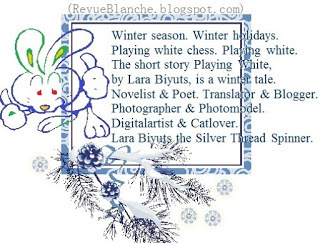 #Halloween #winterholiday #mystery #literature #coupons
#Halloween #winterholiday #mystery #literature #coupons https://www.smashwords.com/books/view/262541
Anyone who buys a copy of my Beyond Silver Threads Spinner, and then emails me at larisabee@yahoo.com, I'll email you back with a free copy of my winter-tale Playing White, mystery, 11 880 words, in a PDF:
https://www.smashwords.com/books/view/264429
Winter season. Winter holidays. Playing white chess. My 11880-word short story Playing white is set in St Petersburg. The main personage is Oscar Maria Graf, globe-trotter and younger contemporary of Oscar Wilde. A Stenbock-like figure, by his origin and his dabbling in literature, Oscar Graf is much hotter, more active and of greater vitality than Eric Stenbock (1860-1895) who is no more, by the time of the story. Time: the first year of Wilde’s imprisonment. On the Christmas eve, Oscar and his boyfriend Felix receive some news which whirls them away to a mystery of the past. All personages are aged 20+. Happy ending.
Thanks and enjoy! Author, larisabee@yahoo.com
Published on August 16, 2015 05:16
July 26, 2015
the birthday gift

My birthday gift to myself. It's my latest novel Through the Baltic Looking-Glass.
https://www.smashwords.com/books/view/505270
Edwardian era mystery. Set in Europe in 1912, my novel “Through the Baltic Looking-Glass” is written in the form of travel notes by Oscar Maria Graf, observant globe-trotter, younger contemporary of Oscar Wilde. A Stenbock-like figure, by his origin and his dabbling in literature, Oscar Graf is much hotter, more active and pragmatic than Eric Stenbock (1860-1895) whom he was friend with, when he lived in London. The book was previously self-published in a series of nice books. PART 1 “In the Island. Adventures”: The series of his adventures on a fictional island on the Mediterranean Sea seem to come to an end, when he receives a message from his homeland in the fictional Baltic country of Nyomanland. In the message, his cousin asks him to come home, because the cousin’s mother disappeared and something’s wrong at the household. Later, on his way, Oscar meets one mysterious foreigner of the name of Kornelis Aboleo Lord Ravensable von Holstein who travels along with his cousin Adrian Magnhus Lord Wolfhampton von Holstein. The foreigners stay in Brumburg, the main city of Nyomanland. PART 2 “On the Continent. Quest I”, PART 3 “On the Continent. Quest II”, PART 4 “Ghosts, Notes, and Other Evidence”, PART 5 “Liberties with the Dark”, PART 6 “Theatre des Noctambules”, PART 7 “Gay with Streamers”, PART 8 “Darkness to Illuminate”, PART 9 “From the Owl’s Wing to the Bat’s”. Word count 223 000
http://www.lulu.com/content/16081349
http://amzn.com/B00F1TPRPIthe first review at Amazon :
http://www.amazon.com/review/R2LFEVXMWTTVUO/ref=cm_cr_dp_title?ie=UTF8&ASIN=B00F1TPRPI&channel=detail-glance&nodeID=283155&store=books
my novella "A Handful of Blossoms". Reviews at Amazon :
http://www.amazon.com/A-Handful-Blossoms-Lara-Biyuts/product-reviews/1471727963
"Greek Fire"
by Selected International Poets et al. I am one of the contributors.
http://amzn.com/1508589852
Download the new FREE eBook of short stories and poems from an international group of authors: "Of Words and Water" 2014https://www.smashwords.com/books/view/452447I am one of the contributors. Thank you all for your support.http://www.amazon.com/Words-Water-2014-Jay-Howard-ebook/dp/B00LIC5MHU/http://www.elizabethlos.com/supporting-water-aid/Of Words and Water - 2014https://www.smashwords.com/books/view/452447
more my bookcovers:
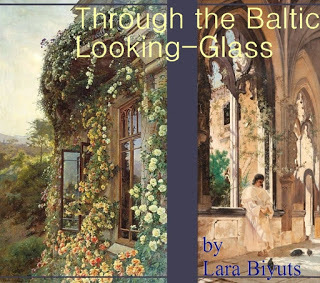
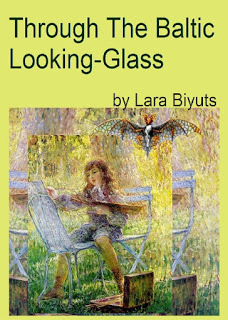
more about 26 July :
http://revueblanche.blogspot.com/2012/07/26july.html
:)
Published on July 26, 2015 01:08
July 7, 2015
your trees

In love with trees. Fond of trees. Admiring trees.
Please, share your pictures of trees growing in unlikely places of cities !
This old tree is coming from the old stone wall. It is tall and living --
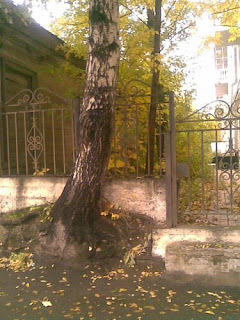
This tree is growing across the pavement, lonely. The crone is high above. The tree is curved but it’s growing high, taller than the two-storey building --

This tree is not fallen; it’s growing aslant. Will to Live --

This tree is growing from a stump, a sap shoot, with the young growth around --

Published on July 07, 2015 03:17
April 12, 2015
blood flower
 “Red Scum” is a story from the book of stories with a working title CREPUSCULAR RAYS, by Lara Biyuts, the next in the “OMG series”, the series of stories about and by Oscar Maria Graf, observant globe-trotter and writer, younger contemporary of Oscar Wilde. A Stenbock-like figure, by his origin and his dabbling in literature, Oscar Graf is much hotter, more active and pragmatic than Eric Stenbock (1860-1895) whose friend he used to be in virtue of his living in London. His homeland is the fictional Baltic country Nyomanland. Oscar Maria Graf is the main character of the historical “Through the Baltic Looking-Glass” by Lara Biyuts.
“Red Scum” is a story from the book of stories with a working title CREPUSCULAR RAYS, by Lara Biyuts, the next in the “OMG series”, the series of stories about and by Oscar Maria Graf, observant globe-trotter and writer, younger contemporary of Oscar Wilde. A Stenbock-like figure, by his origin and his dabbling in literature, Oscar Graf is much hotter, more active and pragmatic than Eric Stenbock (1860-1895) whose friend he used to be in virtue of his living in London. His homeland is the fictional Baltic country Nyomanland. Oscar Maria Graf is the main character of the historical “Through the Baltic Looking-Glass” by Lara Biyuts.
 OMG! NSFW! NOT SAFE FOR KIDS! NOT SAFE FOR PRUDES! NOT SAFE FOR RELIGIOUS FANATICS AND HATERS!https://www.smashwords.com/books/view/505270
OMG! NSFW! NOT SAFE FOR KIDS! NOT SAFE FOR PRUDES! NOT SAFE FOR RELIGIOUS FANATICS AND HATERS!https://www.smashwords.com/books/view/505270http://www.lulu.com/content/16081349
RED SCUM
“The most about my life in the old merry Nyomanland has been erased from my memory. Vanished in the dark,” such was the reply of Count Eric Stenbock -- my friend who lived in England most of his life -- to the request of the small circle of his guests, who adjourned to the drawing-room of his spacious apartment, after dinner, one rainy day in November, in London. Unlike most of his parties, this one could not be named totally informal, because Eric’s publishers were among his guests. At coffee, everyone felt like gossiping, but we shied off from all allusions to the upcoming trial of Oscar Wilde. We began story-telling.“Exactly?” I said with the intention to encourage him one way or another. “Oscar…” he said in reply to me, ”…as an author you know that different periods of one’s life can mutually erase some impressions to each other, even brightest impressions, smoothing over things and features.” Both he and I were amateur writers, with me highly appreciating his book of verse Rue, Myrtle, and Cypress. “However…” Eric stopped short, with his big, hazy figure deepening into his chair, “…there is one story that used to be of interest to me, much, and it took place in Nyomanland.”We asked him to tell the story that promised telling about the remote land. He began by saying, “That year, on my way to Kolga, Estonia, I stayed at the town of Mitava, Nyomanland.” Glancing at the wall with a picture by one of the tremendous landscapes Julius von Klever, he said, “I was with someone there.” “With your Little Count?” I said, meaning “le Petit Comte”, the doll that was at the table with us. Eric shocked his relatives calling the doll his son. If you wanted Eric to be nice to you, you should ask about his son’s health. “True,” he said, “my son was with me, but le Petit Comte stayed in, when I went out for sightseeing. On my arrival at Mitava, I met one young man, who became my mate for my stay in Nyomanland. The young man was an Englishman who lived in the town and worked as a clerk. But he could leave his office for walks with me. It’s nice to encounter a compatriot while pilgrimizing. Reggie showed me the city, and the next daywe went to countryside. After three hours at the racetrack, in the sunshine of late June, we went to look for a pub, and we found it. It was delightful, in the shady tavern, after the hot sunshine. A few men. Like we, those were happy and unhappy betters who chattered and discussed the bookmakers’ odds.A man, owner of a panama hat, said to his companion, owner of a gray hat, over a pint of beer, ‘By gosh! When I was going to back the horse, you said – do you remember what you said?’ ‘Yes, unless nobody should back a horse like that one…’‘But people got a lot of money for it!’‘Actually, my choice was the right horse…’‘Really? Right horse? This is what I’ll say, my dear… you wanted to visit me tomorrow, didn’t you? Right? You did?’‘Well, suppose, yesIdid – why?’‘I won’t be home tomorrow. So sorry.’‘You see… actually, I…’‘Perhaps, you are going to come a day after tomorrow? Next week, maybe? In a month? I won’t be there, anyway.’ His companion rose and put his gray hat on. Panama Hat said, ‘Farewell!’Gray Hat went to exit. Seeing my attention, Panama Hat said, ‘It was my first time.’I invited him to our table.Taking the seat, Panama Hat sank his thrum beard and said, ‘I’ll go to racetrack never again. No way, no how. To let them take my money! To depend on a horse! How silly! I hardly can understand why an educated man let himself downshift to the state when he is ready to be sitting and feverishly waiting till the moment when he is given 100 coins for his 10. The money which he never earned! No. A good book by a favorite author, a sophisticated theatre show, or a good talk with friends whose views are dear to you – that’s what must fill life of a man with cultured mind. Unless, I’ll go there on Friday, for the final time. They say that prizes will be great and there are some horses with a good winning chances. I must win back my loses, after all.’As the men in tavern kept drinking, the noise level crept up a notch or two. Suddenly, a male voice of a singer was heard. It was an old man who could be something like a vagabond singer, a blind musician in company of his guide, a teenage boy.Playing his psaltery, the Blind Musician began singing a ballad about a battle between the locals and the Knights in the vicinity of Mitava. The lyrics took my fancy. The ballad was about a besieged castle. The defenders of Nyomanland withstood the siege, for a long time, but all food supplies were over, wells of the castle had dried up, and then the people offered to the Knights to meet at a battle on the bottom of the dry moat. Just listen: the dry moat! The siege was truly long and exhausting. The Knights agreed to the offer, and the two sides of warriors met. The battle was long, but the end was unfavourable to the defenders of Nyomanland. All of them were killed in the moat of the castle -- a lot of the Knights fell along them. This is my translation of the ballad’s ending:
Centuries passed away, the walls fell.Grass overgrew the gun slots,cobwebs over the chambers in the towers.The forest where there once was the courtyard.A ploughman works where there once was the brook. All desolated or changed. Humans, their malice and rage, all sleep deep underground. Quietude. Nothing reminds of the past –only the flower, Blood Flower alone tells about what happened here. Giving both joy and sorrow.Joy and sorrow.
The singer finished and, after being paid some measly amount of money he and his guide left the tavern. Standing up and taking my hat in hand, I said to my companions that I wanted to talk to the old man. Both Reggie and Panama Hat followed me. The hubbub of voices was heard from the tavern that we had left. It was late afternoon. The sunshine was not so scorching, and the nature seemed to free itself from the languor of the day. Bushes looked dusty and withering along the road. The golden fields of barley resembled a sea. The thin soft-green stripes of flax between the fields. Dry ears of wheat rustled in the wind. For walkers, the thick carpet of clover with purple and white pompons beckoned. The cows’ bells sounded melancholic. Grasshoppers and dragonflies sang; the lark’s merry notes were heard from the sky. But the road was empty but the couple from the tavern who I wanted. The Balladeer in his wide brimmed hat and the guide boy wearing his gray cap. I said to my companions that I took interest in the ballad and a talk talk with the singer about the lyrics. Noticing us just behind them, the boy looked alarmed, but I made a soothing gesture and gave him a coin. Then I turned to the Blind Musician, ‘Tell me, Balladeer, does the place exist? The place from your ballad.’‘All what ballads tell about is true,’ the old man said.‘May we see the place? Will you show the way?’‘I’ll show it to you – why not – only I beg you, sirs, promise not to touch the Blood Flower! It bestows sorrow and misfortune sooner than joy.’We promised not to touch the Blood Flower. The old man told his guide to lead him to the place of the legendary battle.After having to walk for some more time we finally saw some remains of some ancient fortress. We approached the place and were immediately awestruck by a beautiful yet disturbing picture.Underneath our feet, the broad eroded moat was covered with mentioned red flowers all over, with the prickly thick leaves hardly seen among the red petals. The moat seemed bloodstained.The Balladeer said, ‘The flowers grow on the bones and blood. Nowhere else in our country you can find flowers like these. Every man who touches the flower is fated to misfortunes and misery. The reverse may be true, but it hardly ever happens. If the flower brings luck, the luck is for ever.’The guide boy said, ‘If one cuts the flower’s leaf, a milky sap is trickling from it. Smelly and sticky.’ The three of us, tourists, went to walk among the flowers to see them. The Blind Musician stayed to take a rest sitting on a stone.‘Whatever the old dotard tells,” Reggie said, “let’s have a flower, as a souvenir, and go home.’We did it. Each of us slipped off a flower and concealed the flowers inside out hats. The guide boy seeing this, I gave him a coin in exchange for his silence. ‘If you, gentlemen, want to see the ruins…’ the guide boy said. Then we followed him, going up towards the fortress. Climbing up the slope, we went to the ruins of the castle walls.I was the first to reach the top of the height. Picturesque views around and underneath me. The deep moat, which I had left, seemed bloodstainedyet more. On the other side of the hill, the endless panorama of fields spread up to the horizon. Gosh! It’s good to be alive, seeing the views! I enjoyed, when a cry made me look back.Reggie tumbled into the moat, apparently stumbling upon something, and our guide cried seeing this.A fall like this could not do much harm to the young man: the grass was tall and thick. I didn’t worry about him. Reggie rolled down to the bottom of the moat and remained lying motionless as a dark spot on the sanguine carpet.‘Are you all right?’ I cried out, ‘Stand up! That’ll do. Stand up!’But he was motionless. Then I quickly descended into the moat and dashed to him.Despite my pushing to him, my mate didn’t move. Assuming that he fainted, I tried to revive him. In vain: he looked lifeless. More examination -- and the trickle of blood from his left temple showed the terrible truth.Reggie was dead. Tumbling down the slope he obviously hit his head against a stone. A big one. No other stones about. Blind chance. He lost his hat, and the fatal flower was nearby. Panama Hat and I were too shocked to care about the flower. Seeing the crumpled flower, the guide boy said, ‘The flower killed your friend, sirs.’Dumbstruck we stared in disbelief at the dead body of the young man who had been full of life just moments ago. We – Panama Hat and I – asked the guide boy to stay by my dead friend till people from the town came.Panama Hat and I returned along with a doctor who confirmed the death. Reggie’s death was a terrific event, but one’s young age is moody, and soon I forgot my young compatriot. Either it was a mere chance or the Blood Flower’ revenge – who knows? Panama Hat won a great deal of money in his next time at the racetrack, but I forgot to ask him about his flower -- and I keep mine.” He went to a locker. From a shelf Eric took out a glass box. “Here it is --”The dry flower was in the box. The shrunken and cockled petals were gore coloured.After all of us satisfied our curiosity, Eric said, “So, one of us, the Blood Flower keepers, has died; another one has won a fortune, and I… I spent a year in my family estate Kolga and then happily returned to London. Nothing special.” Before anybody of his listeners had time to say anything about his wonderful story, he approached the fireplace and his golden hair and dreamy gray eyes sparkled. “What is to happen to me in the future? Today it looks like a nice day to push luck. I’ll destroy the flower, right now. Tentatively. Just for learning.” With that he threw the flower to the fire. On the instant, the dry flower was burnt down. By the fire, Eric could feel a slight whiff of the bittersweet aroma, if any, and we remained in the chairs. Looking round the room, he sighed, looked round us and said, “Nothing special. Bosh!”
We agreed and sipped coffee.
Lara Biyuts © 2014
Discover more mystery and historical stories by Lara Biyuts:https://www.smashwords.com/profile/view/lasept
“Billiard at Dawn” is the OMG series. HIS LATEST TRICK (adventures). PLAYING WHITE (mystery). THE ITALIAN IMBROGLIO (romance). THE AUTUMN GAY TINTS (homoerotic, banana split).https://www.smashwords.com/books/view/448225
“The Dead that Travel Fast” is a collection of 16 old world tales written and previously web-published by Lara Biyuts. Historical, paranormal, fantasy. Contents:Book 1. EXTRAORDINARY STORY OF A TURNSKINSTORY OF AN UNHAPPY GOBLIN (excerpt from the novel Silver Thread Spinner by Lara Biyuts)STORY OF A WISE VAMPIRE (excerpt from the novel La Arme Blanche by Lara Biyuts)AN OPENING FOR A NOVEL (excerpt from the novel La Arme Blanche by Lara Biyuts)ON LOVE (essay from the book The Sunless Parlour by Lara Biyuts)ALWAYS IN LOVE (essay from the book The Sunless Parlour by Lara Biyuts)Book 2. ITALIAN IMBROGLIOS FUNNY ARITHMETIC FOR HUSBANDSMAGIC VS AVIDITYMAIDEN’S DONKEYTHE ITALIAN IMBROGLIO (from the Oscar Maria Graf series)Book 3. PLAYING WHITEBook 4. SEVERIN Book 5. BEYOND THE SILVER THREADSBook 6. VAMPIRE CANNOT BE YOUR INTERVIEWEEUNDER A SHROUD OF NIGHT IN WEYMARNPRIDE, PREJUDICE AND UNDEAD. FROM A YOUNG VAMPIRE’S NOTESMYSTERIUM TREMENDUM (essay)https://www.smashwords.com/books/view/433390
“Italian Imbroglios” is 4 tales about turnskins and other metamorphoses, imaginative or real, which took place in the past, distant and not so distant, in Italy. FUNNY ARITHMETIC FOR HUSBANDS, MAGIC VS AVIDITY, MAIDEN’S DONKEY, THE ITALIAN IMBROGLIO. The last of the tale is the next story in the OMG series. Historical, paranormal, humour. https://www.smashwords.com/books/view/429252
PRIVACY NOTICE. Warning — any person and/or institution and/or Agent and/or Agency of any organization or governmental structure also using or monitoring/using this website or any of its associated websites, you do NOT have my permission to utilize any of my profile information nor any of the content contained herein including, but not limited to my writings, my photos, and/or the comments made about my photo’s or any other “picture” art posted herein. You are hereby notified that you are strictly prohibited from disclosing, copying, distributing, disseminating, or taking any other action against me with regard to this profile and the contents herein. The foregoing prohibitions also apply to your employee(s), agent(s), student(s) or any personnel under your direction or control. The contents of this profile are private and legally privileged and confidential information, and the violation of my personal privacy is punishable by law.
Published on April 12, 2015 06:33



